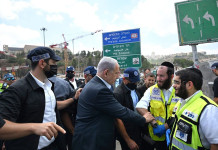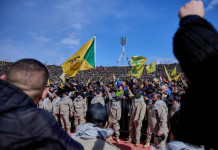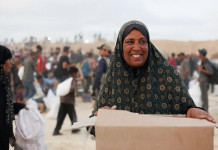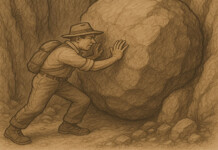Q & A: Incongruous And Unbecoming (Part IV)
Question: Lately I've seen some young men who, though they wear a yarmulke, have ponytails or long unruly hair. I've even seen some ear piercings. Somehow I find this behavior to be incongruous. My real problem is that my own nephew and a few of his friends wear their hair in this manner. Even though his parents look upon it as a passing fad, I am at a loss to understand such behavior. Luckily, whether right or wrong, I've held my tongue. I wonder what the proper positive action to take is in this matter.
No Name Please
Q & A: Incongruous And Unbecoming (Part III)
Question: Lately I have seen some young men who though they wear a yarmulke have ponytails or other long unruly hair – I’ve even seen some ear piercings. Somehow I find this behavior to be incongruous.
Q & A: Incongruous And Unbecoming (Part II)
Question: Lately I've seen some young men who, though they wear a yarmulke, have ponytails or long unruly hair. I've even seen some ear piercings. Somehow I find this behavior to be incongruous. My real problem is that my own nephew and a few of his friends wear their hair in this manner. Even though his parents look upon it as a passing fad, I am at a loss to understand such behavior. Luckily, whether right or wrong, I've held my tongue. I wonder what the proper positive action to take is in this matter.
No Name Please
(Via E-Mail)
Q & A: Ayin Hara (Part I)
Question: I know there is a dispute in the Gemara regarding ayin hara, the evil eye. Can you discuss the origin of it?
Ben Glassman
(Via E-Mail)
Q & A: Ayin Hara (Part II)
Question: I know there is a dispute in the Gemara regarding ayin hara, the evil eye. Can you discuss the origin of it?
Ben Glassman
(Via E-Mail)
Q & A: Ayin Hara (Part III)
Question: I know there is a dispute in the Gemara regarding ayin hara, the evil eye. Can you discuss the origin of it?
Ben Glassman
(Via E-Mail)
Q & A: Ayin Hara (Part IV)
Question: I know there is a dispute in the Gemara regarding ayin hara, the evil eye. Can you discuss the origin of it?
Ben Glassman
(Via E-Mail)
Q & A: Ayin Hara (Part V)
Question: I know there is a dispute in the Gemara regarding ayin hara, the evil eye. Can you discuss the origin of it?
Ben Glassman
(Via E-Mail)
Q & A: Ayin Hara (Part VI)
Question: I know there is a dispute in the Gemara regarding ayin hara, the evil eye. Can you discuss the origin of it?
Ben Glassman
(Via E-Mail)
Q & A: Biblical Blue Fringe: Will the Real Chilazon Please Stand Up!
In February we conducted a thorough discussion of the mitzvah of techeilet. The following guest piece by Baruch Sterman, marking 20 years since the establishment of the Ptil Tekhelet Foundation (www.tekhelet.com), is a follow up to that discussion.
Q & A: Sidra Or Parasha?
QUESTION: I have noticed that some refer to the weekly Torah portion as Parashat Hashavua while others refer to it as the week's Sidra. Which is correct?Eliyahu TewelVia E-Mail
Q & A: Netilat Yadayim (Conclusion)
QUESTION: Does one wash one's hands in the bathroom with soap and water, or by pouring [fresh] water from a vessel with handles three times on each hand alternatingly? I have heard it said that a vessel is used only in the morning.A ReaderNew York, NY
Q & A: Effort And Diligence In Torah Study (Conclusion)
QUESTION: I recently read your Daf Yomi column (JP, June 13, 2003), where you cited the Chikrei Lev's comments regarding the standard of 'Sinai' in Torah study, that is, having extensive knowledge of the Torah. He stated that this is not as important today because the Mishna has been recorded.My question is: Was the Mishna not recorded in Rashi's time? Commenting on the first verse in Parashat Bechukotai, Rashi notes (based on Sifra) that "Im bechukotai tele'chu" means "shetih'yu amelim baTorah." In yeshiva I was taught that this means that one must toil with much effort to learn and understand Torah. If so, how can one not be expected to have an extensive knowledge and yet be amel baTorah?Zvi Kirschner(Via E-Mail)
Q & A: Sinat Chinam Destroyed Our House
QUESTION: Our Sages strongly condemned sinat chinam - yet at times, good resulted from it. For example, when the sons of Yaakov went down to Egypt many years after selling their brother, they were treated royally.Shlomo FeivelsonCoconut Creek, FL
Q & A: Reincarnation?
QUESTION: I am told that Eliahu was a reincarnation. Who was he?R. GoldBronx, NY
Q & A: How To Treat A Ger (Part I)
QUESTION: The Rambam unequivocally states that a Jew by choice should be treated as an equal to any other Jew in all respects. In our synagogue we had a serious rift regarding this issue and many members left the synagogue. What happened was that a proselyte, a ger, ran for the position of president of the congregation. He had served as the secretary of the congregation and he was respected and liked by the members of the congregation. The rabbi of the congregation ruled that since he was not a Jew from birth, he could not run for the position of president of the congregation or occupy a position as an officer of the congregation. I would like to know, from your perspective, what the halacha is on this important issue.Name withheld by request(Via E-Mail)
Q & A: How To Treat A Ger (Conclusion)
QUESTION: The Rambam unequivocally states that a Jew by choice should be treated as an equal to any other Jew in all respects. In our synagogue we had a serious rift regarding this issue and many members left the synagogue. What happened was that a proselyte, a ger, ran for the position of president of the congregation. He had served as the secretary of the congregation and he was respected and liked by the members of the congregation. The rabbi of the congregation ruled that since he was not a Jew from birth, he could not run for the position of president of the congregation or occupy a position as an officer of the congregation. I would like to know, from your perspective, what the halacha is on this important issue.Name withheld by request(Via E-Mail)
Q & A: Tractate Avot
QUESTION: Why is Avot prefaced with a mishna from another tractate? Also, why do we refer to this tractate as Avot, meaning "fathers"?Shlomo FeivelsonCoconut Creek, FL
Q & A: ‘Bal Tosif’ And The Shofar Blasts (Part I)
QUESTION: I do not understand the practice of blowing so many extra blasts of the shofar, as is done in most synagogues on Rosh Hashana. Is that not in violation of the command bal tosif, as stated in Deuteronomy (13:1), "You shall not add to [G-d's command-ments]"?Elliot Solomon(Via E-Mail)
Q & A: ‘Bal Tosif’ And The Shofar Blasts (Conclusion)
QUESTION: I do not understand the practice of blowing so many extra blasts of the shofar, as is done in most synagogues on Rosh Hashana. Is that not in violation of the command bal tosif, as stated in Deuteronomy (13:1), "You shall not add to [G-d's commandments]"?Elliot Solomon(Via E-Mail)
Q & A: Noy Sukka – Sukka Decorations (Part I)
QUESTION: Is decorating the sukka part of the mitzva, or does the mitzva only require the sukka itself?Moshe JakobowitzBrooklyn, NY
Q & A: Noy Sukka – Sukka Decorations (Conclusion)
QUESTION: Is decorating the sukka part of the mitzva, or does the mitzva only require the sukka itself?Moshe JakobowitzBrooklyn, NY
Q & A: Yom Kippur Katan
QUESTION: What are the origins and customs of Yom Kippur Katan, lit. "the lesser Yom Kippur?"Ben GlassmanBrooklyn, NY
Q & A: Kiddush Levana (Part I)
QUESTION: Why do we say Shalom Aleichem at Kiddush Levana, when we bless the new moon, and why do we do so three times? Is it because we have not seen a new moon for a whole month? Can you explain a little more about this mitzva?Ira WarshanskyPhiladelphia, PA
Q & A: Kiddush Levana (Conclusion)
QUESTION: Why do we say Shalom Aleichem at Kiddush Levana, when we bless the new moon, and why do we do so three times? Is it because we have not seen a new moon for a whole month? Can you explain a little more about this mitzva?Ira WarshanskyPhiladelphia, PA
Q & A: ‘Tal U’Matar’ When A Person Leaves Israel After The 7th Of...
QUESTION: What does a person do if he left Israel after the 7th of Cheshvan (which was on November 2 this year), where they already commenced saying "Ve'ten tal u'matar," but before they start doing so in the diaspora (typically on December 5, but on December 6 at Maariv this year, since the evening of December 5 is a Sabbath)?Isaac HagerBrooklyn, NY
Q & A: A Kohen Traveling By Airplane To Israel
QUESTION: I am a kohen and will soon be traveling to Israel for the first time. I have been told that very often EL AL and other carriers transport remains for burial in Israel, and therefore I must check the flight. Is that so?
Q & A: Brit Milah – A Unique Mitzva (Part I)
QUESTION: Why did Abraham originally not observe brit milah? I have heard that he observed the whole Torah based on his own understanding.Arye Reed(via e-mail)
Q & A: Brit Milah – A Unique Mitzva (Part II)
QUESTION: Why did Abraham originally not observe brit milah? I have heard that he observed the whole Torah based on his own understanding.Arye Reed(via e-mail)
Q & A: Brit Milah – A Unique Mitzva (Conclusion)
QUESTION: Why did Abraham originally not observe brit milah? I have heard that he observed the whole Torah based on his own understanding.Arye Reed(via e-mail)



















